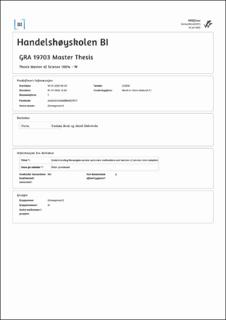| dc.description.abstract | The innovation of artificial intelligent powered service robots has rapidly
revolutionized the service sector by increasing competitiveness and maximizing
efficiency. Therefore, an increasing number of service organizations are employing
service robots to deliver services that advance customer experience. However,
research on customers' psychological motivations and barriers in adoption of
service robots remains fragmented and sparse. Thus, this study specifically analyzes
factors that motivate Norwegian service customers and what barriers impede their
service robot adoption. In this context, service robots are defined as an artificial
intelligence robot that autonomously or semi-autonomously provides personalized
services through interaction with service organizations' customers.
This study aims to improve the Service Robot Acceptance model first introduced
by Wirtz et al (2018) by testing it with functional elements (ease of use, usefulness,
and trust), and enhancing it by introducing rational elements (limited perception,
lack of human interaction and cultural barriers) that influence Norwegian customer
service robot adoption. To answer the research question and hypothesis derived
from literature review, an online survey was distributed through Facebook and
LinkedIn, where 189 representative respondents were attained.
Results from the hierarchical regression analysis provides evidence that factors
such as ease of use and usefulness have a great positive effect that drives Norwegian
service customers adoption of service robots. While trust has no statistical
significance and shows a vital area that needs improvements. Furthermore, this
study shows that all rational elements generate negative effects that impedes
customer adoption of service robots. Lastly, this study elaborates theoretical and
managerial implications with guidance based on this study's findings, in addition to
suggestions for future research. | en_US |
